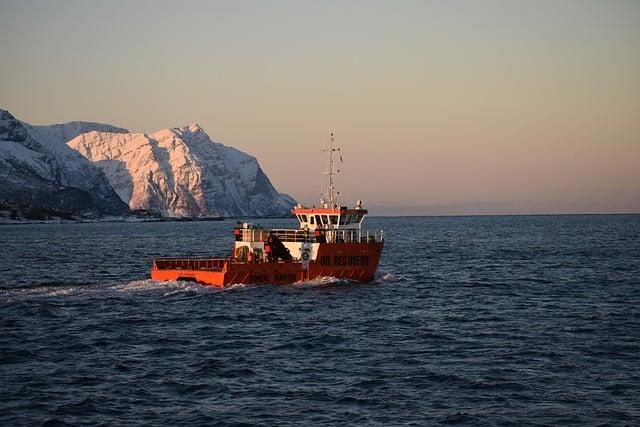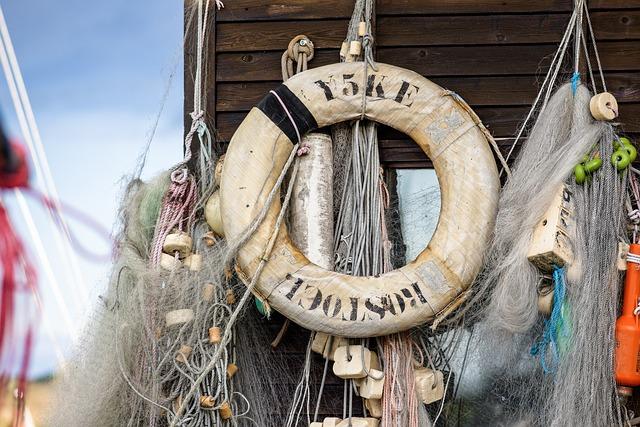impression of the Resolution on Regional Vitality Safety
The latest determination by Finnish and Estonian grid operators to chorus from seizing a ship suspected of involvement in sabotage incidents has important implications for regional power safety. By selecting to keep away from speedy motion, these international locations sign their dedication to diplomatic options and collaborative approaches to handle potential threats throughout the power sector. This determination could assist to alleviate stress within the area, fostering a cooperative environment amongst Baltic nations that share frequent power pursuits. The method taken might additionally strengthen belief in cross-border power buying and selling and joint infrastructure initiatives, which are important for sustaining robustness in power provide chains.
Tho, this stance additionally raises questions concerning the preparedness and responsiveness of nationwide safety frameworks. As tensions surrounding power sources escalate, it turns into essential for the Baltic states to develop in depth methods to mitigate dangers related to potential sabotage, together with:
Investing in superior surveillance applied sciences to observe maritime actions.Enhancing cooperation with worldwide safety companies for shared intelligence.Implementing contingency plans that prioritize swift motion towards imminent threats.
The impression of this determination will doubtless reverberate past speedy power safety considerations, affecting political dynamics within the area and difficult policymakers to take care of a delicate stability between safety and diplomacy.
Exploring the Background of the Sabotage Suspect Ship

The latest determination by Finnish and Estonian grid operators to not seize the ship linked to suspected sabotage actions raises a number of questions in regards to the robustness of maritime safety in the Baltic Sea.This vessel, reportedly recognized as a potential participant in acts aiming to disrupt vital power infrastructure, has been a topic of intense scrutiny.Numerous intelligence studies have highlighted considerations over its actions and connections with recognized felony organizations, notably in relation to key undersea cables and pipelines which are very important for regional power provides.
In mild of the continuing investigations, stakeholders are contemplating varied elements that affect the operational context of such vessels. Some of those elements embrace:
Authorized Implications: The complexities surrounding maritime legislation make any seizure a fragile matter.Financial Ramifications: Such actions might have an effect on transport lanes and commerce relationships inside the EU.Safety Dangers: Escalating tensions might provoke retaliatory measures from concerned events.FactorDescriptionOperational ContextThe geopolitical implications of maritime actions in the Baltic.Public PerceptionHow actions towards the vessel are seen by the general public and media.Worldwide RelationsImpact on diplomatic ties between international locations concerned.
Authorized and Environmental Implications of Non-Seizure

The choice by finnish and Estonian grid operators to chorus from seizing a ship suspected of sabotage raises a number of authorized concerns. Worldwide maritime legislation governs such actions, sometimes requiring clear proof of wrongdoing earlier than a vessel may be detained. On this case, the operators should navigate advanced jurisdictional points, as each international locations function below totally different authorized frameworks whereas adhering to overarching EU laws. The implications of this alternative might set precedents for future instances concerning maritime safety and the duties of maritime operators in comparable conditions.
Furthermore, the environmental implications of non-seizure can’t be ignored. Ought to the vessel be harboring dangerous supplies or emissions, the determination to enable it to stay unseized poses a possible threat to marine ecosystems. Elements to think about embrace:
Potential for spills: A compromised ship might leak dangerous substances, impacting native wildlife and waters.Lengthy-term ecological results: Non-action might end in irreversible injury to the habitat, affecting biodiversity.Public notion: Failure to act could lead on to an absence of public belief in authorities liable for defending pure sources.
Stakeholder Reactions and public Sentiment on the Matter

In the wake of the choice by Finnish and Estonian grid operators to chorus from seizing a ship linked to a sabotage suspect, a wide range of stakeholders have expressed their views on the matter. Trade analysts have voiced considerations concerning the potential implications for regional safety and power stability, highlighting that the absence of decisive motion might result in elevated tensions in an already delicate geopolitical panorama. Conversely,authorities officers from each nations have defended the choice,emphasizing the significance of adhering to due course of and the need of compiling ample proof earlier than taking any drastic measures.
Public sentiment seems to be divided, reflecting a vary of opinions from totally different demographics. A latest survey indicated that roughly 55% of respondents consider that speedy motion ought to have been taken, whereas 35% asserted that the choice to not seize the ship was applicable. Among the many causes cited for this division are considerations over nationwide safety and a want for due diligence. The next factors encapsulate the prevailing opinions amongst residents:
Help for Instant Motion: Concern of accelerating threats to nationwide safety.Advocacy for Persistence: Choice for a thorough examination earlier than any daring strikes.Name for Openness: Request for clearer communication from authorities concerning the scenario.
Suggestions for Future Maritime Safety Measures

The choice by Finnish and Estonian grid operators to chorus from seizing the ship suspected of sabotage highlights the want for extra efficient maritime safety protocols.To stop future incidents,it’s important to boost collaboration amongst international locations within the Baltic Sea area and additional afield. such collaboration might contain:
Joint intelligence sharing: Establishing a complete framework for real-time information sharing to observe sea site visitors and potential threats.Common joint naval workouts: Conducting coaching drills that target responding to sabotage or different threats towards maritime infrastructure.Strengthening authorized frameworks: Harmonizing legal guidelines concerning maritime safety and sabotage throughout jurisdictions to guarantee well timed motion towards potential threats.
Moreover, investing in superior surveillance programs and expertise will play a vital function in safeguarding maritime property. This consists of deploying:
Autonomous drones: using aerial and underwater drones for steady surveillance of vital maritime zones.AI-driven analytics: Implementing synthetic intelligence programs to foretell and mitigate dangers based mostly on historic information and real-time monitoring.Cybersecurity enhancements: Guaranteeing that the software program and communication traces of maritime operations are fortified towards cyber threats.
Potential penalties for Cross-Border Vitality Collaboration

The determination by finnish and Estonian grid operators to forego the seizing of a ship suspected of sabotage could have important implications for future cross-border power collaborations. The transfer displays a cautious method in the direction of worldwide relations amid rising geopolitical tensions, which might hinder collaborative efforts meant to boost power safety and infrastructure integration. With out a unified stance on safety measures associated to shared power property, each nations could face elevated vulnerability to exterior threats, undermining public confidence in cross-border initiatives and investments.
Furthermore, this case might reshape the panorama of regional power governance, resulting in a reevaluation of current agreements and future partnerships. Key potential outcomes embrace:
Heightened safety protocols: International locations could implement extra stringent measures to shield vital power infrastructure.Elevated political dialog: Diplomatic channels could strengthen to handle considerations round security and cooperation.Shifts in funding priorities: Buyers might reassess threat elements related to cross-border power initiatives.
In the end, the dealing with of such delicate conditions could dictate the long run viability of collaborative efforts in power, making it essential for authorities to navigate these complexities with strategic foresight.
Future outlook
the choice by finnish and Estonian grid operators to chorus from seizing the ship linked to potential sabotage underscores the complexity and sensitivity surrounding incidents that might impression power safety within the area. This cautious method highlights the cautious balancing act between making certain security and permitting for ongoing investigations.as authorities proceed to analyse the scenario,the main target stays on safeguarding vital infrastructure whereas sustaining transparency and cooperation.The implications of this determination will doubtless resonate all through the power sector, prompting discussions on preventive measures and response methods within the face of rising threats. Continued vigilance and collaboration amongst neighboring international locations shall be important as thay navigate these difficult circumstances.
Source link : https://europ.info/2025/03/07/estonia-2/finnish-estonian-grid-operators-opt-against-seizing-sabotage-suspect-ship-tvp-world/
Writer : Caleb Wilson
Publish date : 2025-03-07 03:35:00
Copyright for syndicated content material belongs to the linked Source.


